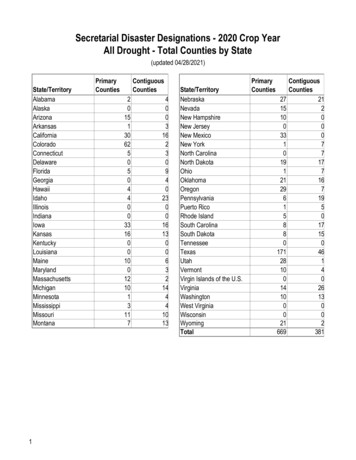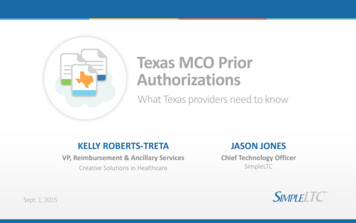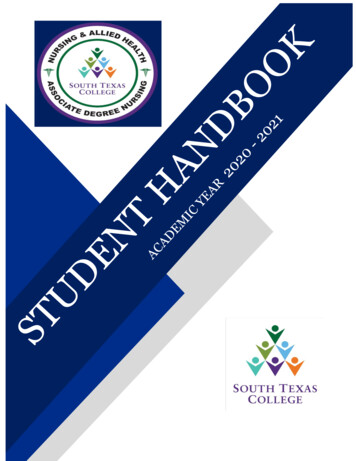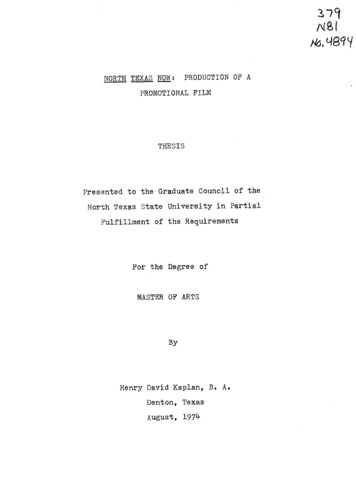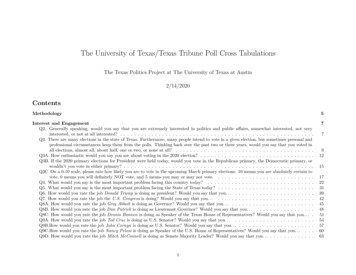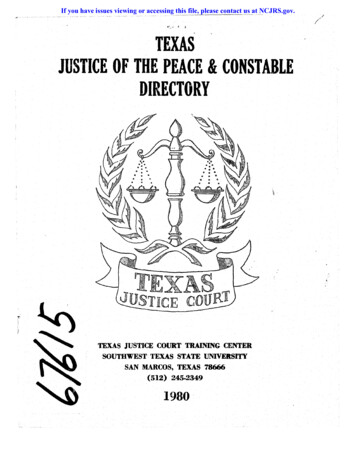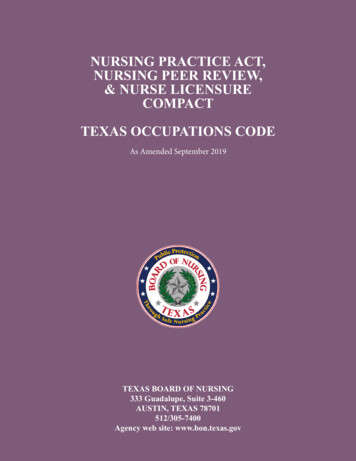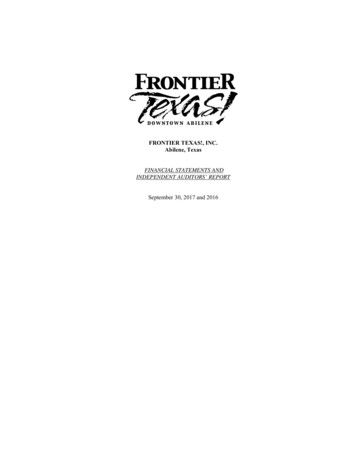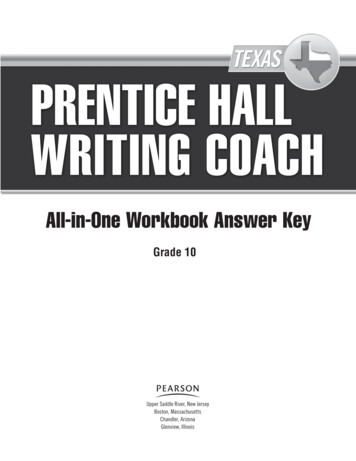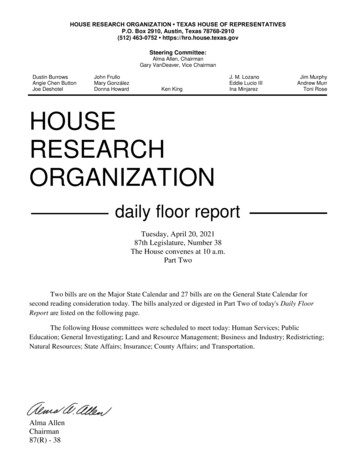
Transcription
HOUSE RESEARCH ORGANIZATION TEXAS HOUSE OF REPRESENTATIVESP.O. Box 2910, Austin, Texas 78768-2910(512) 463-0752 https://hro.house.texas.govSteering Committee:Alma Allen, ChairmanGary VanDeaver, Vice ChairmanDustin BurrowsAngie Chen ButtonJoe DeshotelJohn FrulloMary GonzálezDonna HowardKen KingJ. M. LozanoEddie Lucio IIIIna MinjarezJim MurphyAndrew MurrToni RoseHOUSERESEARCHORGANIZATIONdaily floor reportTuesday, April 20, 202187th Legislature, Number 38The House convenes at 10 a.m.Part TwoTwo bills are on the Major State Calendar and 27 bills are on the General State Calendar forsecond reading consideration today. The bills analyzed or digested in Part Two of today's Daily FloorReport are listed on the following page.The following House committees were scheduled to meet today: Human Services; PublicEducation; General Investigating; Land and Resource Management; Business and Industry; Redistricting;Natural Resources; State Affairs; Insurance; County Affairs; and Transportation.Alma AllenChairman87(R) - 38
HOUSE RESEARCH ORGANIZATIONDaily Floor ReportTuesday, April 20, 202187th Legislature, Number 38Part 2HB 2519 by DarbyHB 2658 by FrankHB 2680 by HullHB 2116 by KrauseHB 872 by BernalHB 1315 by JohnsonHB 1380 by LongoriaHB 1387 by HarrisHB 999 by BernalHB 1694 by RaneyHB 851 by CookExtending deadline for teacher resignations in advance of the school yearAmending administration provisions in Medicaid managed care programModifying certain procedures for parental child safety placementsProhibiting certain covenants in architectural and engineering contractsProhibiting disclosure of water utility customer informationRequiring legal representation for certain foster care youthExpanding circumstances for DIR to negotiate IT cooperative contractsAllowing foster parents to store locked guns without trigger lockTemporarily expanding alternative method for high school graduationCreating a defense to prosecution for those calling 911 for drug overdosesLimiting the effect of certain judicial admissions on modification orders5660646872767880828589
HOUSERESEARCHORGANIZATION bill analysis4/20/2021HB 2519 (2nd reading)Darby, et al.(CSHB 2519 by Dutton)SUBJECT:Extending deadline for teacher resignations in advance of the school yearCOMMITTEE:Public Education — committee substitute recommendedVOTE:12 ayes — Dutton, Lozano, Allen, Allison, K. Bell, Bernal, Buckley,Huberty, K. King, Meza, Talarico, VanDeaver0 nays1 absent — M. GonzálezWITNESSES:For — Laura Kravitz, Texas State Teachers Association; (Registered, butdid not testify: Andrea Chevalier, Association of Texas ProfessionalEducators; Dena Donaldson, Texas AFT; Pamela McPeters, TexasClassroom Teachers Association; Thomas Parkinson)Against — (Registered, but did not testify: Grover Campbell, TASB;Barry Haenisch, Texas Association of Community Schools; Amy Beneski,Texas Association of School Administrators)On — (Registered, but did not testify: Laura Moriaty and DavidRodriguez, Texas Education Agency)BACKGROUND:Education Code sec. 21.033 establishes the State Board for EducatorCertification as a 15-member board that includes four teachers, two schooladministrators, one school counselor, and four citizens. Three of the fourcitizen members must not have been employed by a school district or aneducator preparation program in an institution of higher education in thefive years preceding appointment and the fourth citizen member must nothave been employed by a district or educator preparation program.DIGEST:CSHB 2519 would change the composition of the 15-member State Boardfor Educator Certification (SBEC) to include representatives of small andmid-size districts. The bill would revise the deadline for teachers undercontract with a school district to resign without penalty before the start ofa school year and change SBEC requirements to notify a teacher regardinga complaint or suspension.- 56 -
HB 2519House Research Organizationpage 2Board composition. The bill would require at least two of the sevenpublic school employee members of SBEC to be from a district eligiblefor the small and mid-sized district allotment. Public school employeemembers serving on the board immediately before CSHB 2519 becameeffective would continue carrying out their duties for the remainder oftheir terms. The governor would have to appoint members who meet thebill's requirements, if necessary, on the first two vacancies that occurredafter the effective date of the bill.Resignations. CSHB 2519 would change the deadline for a teacheremployed under a probationary, continuing, or term contract to resignwithout penalty from not later than the 45th day before the first day ofinstruction of the following school year to the 30th day. The deadlinechange would apply beginning with the resignation of a teacher whointended to leave a district's employment at the end of the 2021-2022school year.Complaints and sanctions. If a school district submitted a complaintregarding a teacher under a probationary, continuing, or term contract whoresigned or failed to comply with the resignation deadline or failed toperform the contract, the district would be required to promptly notify theteacher of the complaint. The notice would have to include the basis of thecomplaint, information regarding how the teacher could contact SBEC,and a reminder that the teacher should verify that the teacher's currentaddress is on file with the agency.Before imposing sanctions against a teacher who resigned, SBEC wouldhave to consider any mitigating factors relevant to the teacher's conductand could consider alternatives to sanctions, including additionalcontinuing education or training.Notice of suspension. The bill would require SBEC to promptly notify ateacher of a suspension of the teacher's certificate or permit by certifiedmail. A "teacher" would be defined as a superintendent, principal,supervisor, classroom teacher, school counselor, paraprofessional, or otherfull-time professional employee who is required to hold a certificate. Thenotice would have to include the basis for the suspension and information- 57 -
HB 2519House Research Organizationpage 3regarding the method in which the teacher could respond to thesuspension.The bill's notice requirements would apply only to a complaint or asuspension that occurred on or after the effective date. Its requirement forSBEC to consider mitigating factors would apply only to a disciplinaryproceeding initiated by SBEC on or after the effective date.The bill would take effect September 1, 2021.SUPPORTERSSAY:CSHB 2519 would address concerns that some teachers are being wronglysanctioned for abandoning their contracts when they resign too close tothe start of a school year or miss a notification that a district hadcomplained about their resignation date. The bill would give teachers anextra 15 days to submit their resignations before school begins and ensurethey received notice if a district filed a complaint with the State Board forEducator Certification (SBEC) over the timing of a resignation.At a time when too many teachers are leaving the profession because ofthe COVID-19 pandemic, the bill would prevent SBEC from punishingqualified and respected teachers for minor administrative errors. In somecases, teachers have moved and missed receiving notification of acomplaint or suspension related to their resignation date. This has resultedin a default judgment that bans them from working for a Texas publicschool for one year. Unable to work in their chosen profession, someeducators have found a new line of work and never returned to teaching.The bill also would ensure that SBEC considers the circumstances ormitigating factors of each case and can issue a more positive responsesuch as mandatory training or professional education. This woulddistinguish administrative mistakes from more serious offenses for whicha teacher's certification could be suspended or revoked.A two-week resignation notice is standard practice in the business world.The bill's requirement for a 30-day notice would provide sufficient time inmost cases for a district to replace a departing educator.- 58 -
HB 2519House Research Organizationpage 4CRITICSSAY:CSHB 2519 could make it more difficult for school districts to ensure thateach classroom has a teacher when school starts in August. It has been arequirement since 1995 that teachers resign no later than 45 days beforethe start of the school year. Shortening that time to 30 days fails to takeinto account that teachers generally must report for duty two weeks inadvance of classes starting. District leaders would have insufficient timeto post notice and interview candidates. It could be particularly difficult toreplace teachers in certain subjects or in a rural school district because ofshortages of qualified teachers in those areas.- 59 -
HOUSERESEARCHORGANIZATION bill analysis4/20/2021HB 2658 (2nd reading)Frank(CSHB 2658 by Klick)SUBJECT:Amending administration provisions in Medicaid managed care programCOMMITTEE:Human Services — committee substitute recommendedVOTE:8 ayes — Frank, Hinojosa, Hull, Klick, Meza, Neave, Noble, Shaheen0 nays1 present not voting — RoseWITNESSES:For — James Whittenburg, Longhorn Health Solutions; Kay Ghahremani,Texas Association of Community Health Plans; Laurie Vanhoose, TexasAssociation of Health Plans; Chris Yule, Travis Medical; Leah Rummel,UnitedHealthcare; (Registered, but did not testify: Lawrence Collins,Amerigroup (Anthem); Marisa Finley, Baylor Scott & White Health;Patricia Kolodzey, Blue Cross Blue Shield of Texas; Michael Dole,Driscoll Health Plan; Jessica Boston, Molina Healthcare Inc; EricKnustrom, Private Providers Association of Texas; Karen Cheng, SuperiorHeath Plan; Gregg Knaupe, Texas Association For Home Care &Hospice; Lee Johnson, Texas Council of Community Centers; AshleyFord, The Arc of Texas)Against — John Culberson, American Association for Home Care;Rebecca Galinsky, Protect TX Fragile Kids; Hannah Mehta, Protect TXFragile Kids; Adrienne Trigg, Texas Medical Equipment Providers; SusanBurek; (Registered, but did not testify: Josh Fultz, Protect Texas FragileKids)On — Gary Siller, American Association for Home Care; Linda Litzinger,Texas Parent to Parent; (Registered, but did not testify: StephanieStephens, Health and Human Services Commission)BACKGROUND:Government Code sec. 533.055 requires a contract between a Medicaidmanaged care organization (MCO) and the Health and Human ServicesCommission to include capitation rates that ensure the cost-effectiveprovision of quality health care.- 60 -
HB 2658House Research Organizationpage 2Sec. 533.0063(b) requires, with some exceptions, an MCO to provide apaper copy of the organization's provider network directory to a recipientupon request. Sec. 533.0063(c) requires an MCO participating in theSTAR PLUS or STAR Kids Medicaid managed care program to issue apaper copy of a provider network directory unless the recipient opts out ofreceiving the directory in paper format.Human Resources Code sec. 32.025(g) requires the application form forMedicaid to include: for an applicant who is pregnant, a question regarding whether thepregnancy is the woman's first gestational pregnancy; and a question regarding the applicant's preferences for beingcontacted.DIGEST:CSHB 2658 would amend Medicaid managed care provisions oncapitation rates, provider network directories in paper form, and Medicaidapplication forms.Capitation rates. The bill would add a provision to the capitation ratesrequired in a contract between a Medicaid managed care organization(MCO) and the Health and Human Services Commission (HHSC). Thecapitation rates would have to include acuity and risk adjustmentmethodologies that considered the costs of providing acute care servicesand long-term services and supports, including private duty nursingservices, provided under the plan.To the extent permitted by the terms of the contract, HHSC would have toseek to amend a contract with an MCO entered into before the bill'seffective date to comply with the required capitation rates under the bill.Provider network directory. If a recipient requested to receive theprovider network directory in paper form, the bill would require the MCOto mail the most recent paper directory by the fifth business day after therecipient's request was received.The bill would amend Government Code sec. 533.0063(c) by requiring, atleast annually, an MCO to include in the organization's outreach efforts- 61 -
HB 2658House Research Organizationpage 3and educational materials a written or verbal offer allowing each recipientenrolled in the managed care plan to elect to receive the organization'sprovider network directory, including any directory updates, in paperform.Medicaid application form. The Medicaid application form underHuman Resources Code sec. 32.025(g) would have to include an optionfor an applicant who could be enrolled in a Medicaid managed care plan.The option would allow an applicant to elect to receive the plan's providernetwork directory in paper form, including any directory updates.As soon as practicable after the bill's effective date, HHSC would have toadopt the revised application form under Human Resources Code sec.32.025(g).The bill would take effect September 1, 2021, and would apply only to acontract between HHSC and an MCO that was entered into or renewed onor after the bill's effective date.SUPPORTERSSAY:CSHB 2658 would reduce financial uncertainty and administrativecomplexity in the Medicaid managed care program. The bill wouldimprove the way in which the capitation rate, or the rate at whichMedicaid managed care providers are reimbursed, is determined byrequiring the rate to include a risk adjustment in Medicaid payments inorder to better support the needs of patients with increased acuity, or withmore intensive care needs. This change would help avoid situations wheremanaged care organizations (MCOs) leave Medicaid because ofinsolvency.The bill also would improve efficiency in Medicaid managed care byrequiring MCOs to send a paper copy of provider directories only ifenrollees requested it. Currently, paper directories are automatically sentto enrollees, resulting in the information quickly becoming outdated asproviders leave or enroll in Medicaid. The bill would ensure those whowish to receive paper copies could still opt in to receive them duringMedicaid enrollment.- 62 -
HB 2658House Research Organizationpage 4Concerns about the bill as filed were addressed in the committeesubstitute by removing the provision that would have required the Healthand Human Services Commission to honor a contract requirementenabling a managed care organization to make the initial and subsequentprimary care provider assignments and changes in accordance with statelaw.CRITICSSAY:No concerns identified.- 63 -
HOUSERESEARCHORGANIZATION bill analysis4/20/2021(2nd reading)HB 2680Hull, NobleSUBJECT:Modifying certain procedures for parental child safety placementsCOMMITTEE:Human Services — favorable, without amendmentVOTE:5 ayes — Frank, Hull, Klick, Noble, Shaheen3 nays — Hinojosa, Meza, Rose1 absent — NeaveWITNESSES:For — Judy Powell, Parent Guidance Center; Julia Hatcher, TexasAssociation of Family Defense Attorneys (TAFDA); Andrew Brown,Texas Public Policy Foundation; Maureen Ball; (Registered, but did nottestify: Rebecca Galinsky and Adrienne Trigg, Protect TX Fragile Kids;Meagan Corser, Texas Home School Coalition; Ashley Pardo)Against — NoneOn — Marta Talbert, Department of Family and Protective Services;(Registered, but did not testify: Angie Voss, Department of Family andProtective Services; Thomas Parkinson)BACKGROUND:Family Code sec. 264.901 defines a parental child safety placement(PCSP) as a temporary, out-of-home placement of a child with a caregivermade by a parent or other person with whom the child resides inaccordance with a written parental child safety placement agreementapproved by the Department of Family and Protective Services (DFPS)that ensures the safety of the child: during an investigation by DFPS of alleged abuse or neglect of thechild; or while the parent or other person is receiving services from thedepartment.Family Code sec. 264.902 requires that a PCSP agreement include certainterms clearly stating the respective duties of the person making theplacement and the caregiver, the conditions under which the person- 64 -
HB 2680House Research Organizationpage 2making the placement may have access to the child, the duties of DFPS,the date on which the agreement will terminate subject to certain DFPSpolicies, and any other term the department determines necessary for thesafety and welfare of the child.Under Family Code sec. 264.203, a court on the request of DFPS canorder a parent, managing conservator, guardian, or other member of thesubject child's household to participate in or to permit the child and anysiblings in the house to receive certain services related to abuse or neglect.If the person ordered to participate in the services fails to follow thecourt's order, the court may impose appropriate sanctions, including theremoval of the child.Family Code sec. 263.0061 establishes the right to counsel for parentsinvolved in a status hearing or permanency hearing held after the date thecourt renders a temporary order appointing the department as temporarymanaging conservator of a child, including the right to a court-appointedattorney if a parent is indigent.DIGEST:HB 2680 would modify certain procedures concerning parental childsafety placements (PCSPs), including required PCSP agreement terms, theright to counsel in certain situations, and reporting requirements.The bill would require a PCSP agreement to include a term that clearlystated the agreement would automatically terminate on the earlier of the30th day after the date the agreement was signed or the child was placedwith the caregiver.If a child was subject to a PCSP, before the court could order a parent,managing conservator, guardian, or other member of the child's householdto participate in services, the court would be required to advise anyonewithout an attorney of their right to be represented by an attorney, and ifthe person was indigent and opposed the court order, to advise the personof their right to a court-appointed attorney.DFPS would be required to include children who are placed with acaregiver under a PCSP agreement in any report in which the departmentwas required to disclose the number of children in the child protective- 65 -
HB 2680House Research Organizationpage 3services system who were removed from their homes, including in reportssubmitted to the U.S. Department of Health and Human Services or otherfederal agencies. If a child was placed with a caregiver under a PCSP,DFPS also would be required to report the number of cases in which acourt ordered the parent, managing conservator, guardian or other memberof the subject child's household to participate in services.The bill would take effect September 1, 2021.SUPPORTERSSAY:HB 2680 would provide necessary safeguards and oversight for familiessubject to parental child safety placements (PCSPs) by limiting theduration of PCSP agreements and by requiring the Department of Familyand Protective Services (DFPS) to report new data tracking PCSPs to bothstate and federal governmental entities.PCSPs were originally intended to balance the safety needs of a childduring abuse and neglect investigations with minimizing the traumaassociated with governmental removal of the child from their home.Families undergoing DFPS investigations can be asked to place their childwith another trusted individual known by the child during theinvestigation or while the family is receiving services addressing thealleged abuse or neglect. However, there are concerns that PCSPs areinfluencing families into temporarily giving up their children for openended lengths of time during DFPS investigations with the threat of stateaction for noncompliance with the PCSP agreement.HB 2680 would allow DFPS to continue using PCSP agreements as animportant tool to prevent removals but would add the neededtransparency, oversight, and time limitations for these agreements to workproperly for the families. It would require DFPS to make a decision onwhether to open a case for the child under the PCSP agreement within 30days of placement of the child with the caregiver or the signing of theagreement, whichever was less.Under the bill, families would be empowered to question decisions ofDFPS with the assurance of access to a court-appointed attorney shouldany disagreements arise. Thirty days should be sufficient for DFPS tomake a determination on whether a child is at high risk of abuse or neglectwarranting a government removal of the child. After termination of a- 66 -
HB 2680House Research Organizationpage 4PCSP agreement in which DFPS did not find a high risk or danger, DFPScould continue providing services to the families without the threat ofremoval of the child dictating decisions and participation in services.The separation or removal of a child from their family is one of the mostdrastic measures that the state can impose on a family, and oftentimes themost marginalized Texans are the families subject to these separations orremovals. The bill would help ensure that children were not away fromtheir families for longer than necessary. The bill's reporting provisionswould provide transparency, revealing clear and actionable data thatTexas needs in order to make improvements.CRITICSSAY:Limiting parental child safety placement (PCSP) agreements to 30 daysmay not provide DFPS with adequate time to determine if a family hadmade the necessary behavioral changes for a child to go home, resulting inmultiple or premature governmental removals, which are traumatic for allparties involved. In 2020, the average length of time for children in aPCSP placement was four months. Mandating termination of a PCSPagreement after only 30 days could encourage more removals out of anoverabundance of caution based on an inability to determine risk level tothe child within that time frame or on an inability to determine whethernecessary behavioral improvements in family members were made.There also are concerns regarding the increase in DFPS resources thatwould likely be necessary due to the expected increase in governmentalremovals of children. There would likely be increased resource needs forrelative caregivers or other designated caregivers who receive money fromthe state, for paid foster care, and for full-time equivalents for thedepartment.NOTES:According to the Legislative Budget Board, the bill would have a negativeimpact of about 34.7 million to general revenue related funds throughfiscal 2022-23.- 67 -
HOUSERESEARCHORGANIZATION bill analysis4/20/2021HB 2116 (2nd reading)Krause(CSHB 2116 by Smith)SUBJECT:Prohibiting certain covenants in architectural and engineering contractsCOMMITTEE:Judiciary and Civil Jurisprudence — committee substitute recommendedVOTE:6 ayes — Leach, Julie Johnson, Krause, Middleton, Schofield, Smith0 nays3 absent — Davis, Dutton, MoodyWITNESSES:For — Peyton McKnight, American Council of Engineering Companiesof Texas; (Registered, but did not testify: John T. Montford, Jacobs GlobalEngineering; Richard Lawson, Structural Engineers Association of Texas;Becky Walker, Texas Society of Architects)Against — Shannon Ratliff, Texas Association of Manufacturers andTexas Oil & Gas Association; (Registered, but did not testify: JamaalSmith, City of Houston Office of the Mayor Sylvester Turner; DanielCollins, County of El Paso; Daniel Womack, Dow, Inc.; ThamaraNarvaez, Harris County Commissioners Court; Blaire Parker, San AntonioWater System (SAWS); Hector Rivero, Texas Chemical Council; JayBrown, Valero Energy Corporation)BACKGROUND:Civil Practice and Remedies Code sec. 130.002(b) makes a covenant orpromise in a construction contract void and unenforceable if the covenantor promise provides for a registered architect or licensed engineer whoseservices are the subject of the contract to indemnify or hold harmless anowner or owner's agent or employee from liability from damage that iscaused by or results from the negligence of an owner or an owner's agentor employee. Sec. 130.004 provides general exemptions for owners of aninterest in real property or persons employed solely by that owner fromstatutory provisions related to liability provisions in certain constructioncontracts, except as provided by sec. 130.002(b).DIGEST:CSHB 2116 would impose restrictions on the covenants that could beincluded in, connected to, or collateral to construction contracts forengineering or architectural services related to the improvement of real- 68 -
HB 2116House Research Organizationpage 2property, and would establish a required standard of care for thearchitectural or engineering services provided in relation to such contracts.Covenants. A covenant in connection with such contracts would be voidand unenforceable if it required a licensed engineer or registered architectto defend any party, including a third party, against a claim based whollyor in part on the negligence of, fault of, or breach of contract by the owneror an entity over which the owner exercised control. A covenant couldprovide for the reimbursement of an owner's reasonable attorney's fees inproportion to the engineer's or architect's liability. These provisionsrelated to covenants would not apply to a contract for design-buildservices in which an owner contracted with a single entity to provide bothdesign and construction services.An owner that was a party to a contract under the bill could require thatthe owner be named as an additional insured under the engineer's orarchitect's commercial general liability insurance policy and be providedwith any defense available to a named insured under the policy.Standard of care. Construction contracts for architectural or engineeringservices or contracts related to the construction or repair of animprovement to real property that contained such services as a componentpart would have to require that the services be performed with theprofessional skill and care ordinarily provided by competent architects orengineers practicing under the same or similar circumstances andprofessional license. A provision in a contract that established a differentstandard of care would be void and unenforceable, and the standard ofcare provided in the bill would apply to the performance of thearchitectural or engineering services.Other provisions. The restrictions on covenants and the standard of carerequired by the bill would apply to an owner of interest in real property ora person employed solely by that owner regardless of the generalexemptions for those parties from statutory provisions related to liabilityprovisions in certain construction contracts.The bill would take effect September 1, 2021, and would apply only to acovenant or contract entered into on or after that date.- 69 -
HB 2116House Research Organizationpage 3SUPPORTERSSAY:CSHB 2116 would protect design professionals from uninsurable risk byprohibiting duty-to-defend provisions in design contracts and by requiringa realistic, insurable standard of care for design professionals.Many architectural and engineering contracts contain duty-to-defendprovisions that require the design professional to defend against thirdparty claims of the owner's alleged liability. These provisions cansometimes be triggered even if the design professional was not at fault andthe claim was based solely on the owner's negligence. Defending suchclaims gives rise to costs that may not be covered by professional liabilityinsurance policies, leading to design professionals paying out of pocketfor the owner's legal bills before a determination of liability is made.CSHB 2116 would help prevent this by rendering duty-to-defendprovisions void and unenforceable in construction contracts forengineering or architectural services.Design contracts also would be prohibited from requiring designprofessionals to provide services at an uninsurable and unreasonablestandard of care exceeding that ordinarily provided by competentarchitects or engineers practicing under the same or similar circumstancesand professional license. Insurable standards of care and contractspecifications are beneficial to both the design professionals and theowner, as litigation surrounding construction contracts is often complex,involving multiple parties and interests.The bill would preserve the rights of parties to negotiate the terms ofdesign contracts while balancing the bargaining positions of the parties sothat design professionals were not required to assume most of the riskassociated with a project, ensuring fair and reasonable constructioncontracts.CRITICSSAY:CSHB 2116 would apply a one-size-fits-all approach to constructioncontracts with architects and engineers, which could negatively impactowners in complex projects.The bill could undermine owners' ability to maintain a coordinateddefense in litigation involving construction and design defects in complex- 70 -
HB 2116House Research Organizationpage 4projects by depriving companies of the right to include a duty-to-defendprovision in contracts with architects and engineers. Such provisions areessential to making sure that all of the parties to the contract for a complexproject are on the same page in the event of such litigation.Design has become a collaborative enterprise, usually involving multipleparties working on complex projects together. While duty-to-defendprovisions may be unfair in contracts involving smaller architectural orengineering firms with less bargaining power, more complex projectsusually involve bigger firms that are capable of negotiating forthemselves.- 71 -
HOUSERESEARCHORGANIZATION bill analysis4/20/2021HB 872 (2nd reading)Bernal,
Provider network directory. If a recipient requested to receive the provider network directory in paper form, the bill would require the MCO to mail the most recent paper directory by the fifth business day after the recipient's request was received. The bill woul
